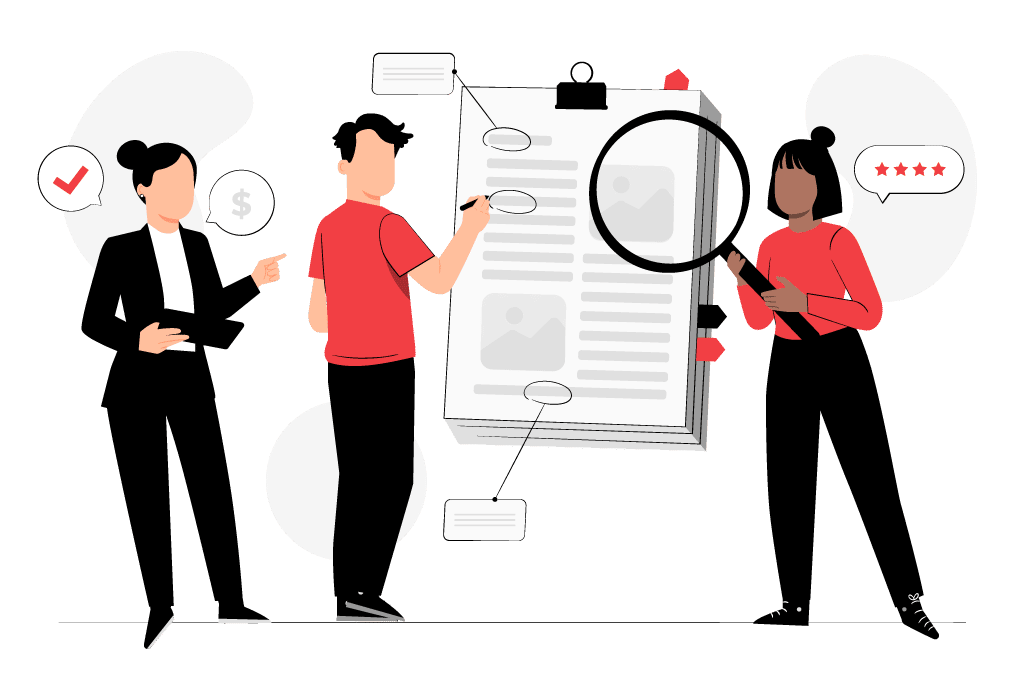As businesses continue to navigate complex financial landscapes, the role of Accounts Assistants has become increasingly vital in maintaining accurate and efficient financial operations. The recruiting trend for Accounts Assistants has witnessed a steady rise in demand, reflecting the growing recognition of their contributions to organizational success.
According to recent industry analytics, there has been a notable increase in job postings for Accounts Assistants, focusing on candidates who possess a combination of technical accounting skills, strong attention to detail, and the ability to adapt to evolving financial regulations. HR professionals and CXOs are crucial in identifying and attracting top talent for these positions, ensuring a competent and reliable team that can effectively support financial processes, maintain compliance, and contribute to informed decision-making.
Here are the top 60 Accounts Assistant interview questions to ask job applicants:
15 general interview questions for the Accounts Assistant
- How would you describe your understanding of basic accounting principles and practices?
- Can you provide an example of when you had to reconcile accounts or resolve a discrepancy in financial records?
- How do you ensure accuracy and attention to detail when working with financial data?
- Can you describe your experience with accounts payable and accounts receivable processes?
- How do you prioritize and manage your tasks when handling multiple financial responsibilities simultaneously?
- Can you explain your familiarity with financial software or accounting systems? Which ones have you worked with?
- How do you handle sensitive financial information while maintaining confidentiality and data security?
- Can you describe your approach to maintaining accurate and up-to-date financial records?
- How do you handle situations where you encounter discrepancies or errors in financial statements?
- Can you provide an example of a time when you assisted in the preparation of financial reports or budgets?
- How do you ensure compliance with relevant financial regulations and company policies?
- Can you describe your experience in conducting bank reconciliations and managing cash flow?
- How do you communicate financial information or reports to non-financial colleagues or stakeholders?
- Can you explain your experience in assisting with the preparation of tax documentation or supporting audits?
- How do you stay updated on changes in accounting standards and industry regulations?
5 sample answers to general interview questions for the Accounts Assistant
- How would you describe your understanding of basic accounting principles and practices?
Look for: Solid understanding of fundamental accounting principles and the ability to articulate them clearly.
Example answer: “I have a strong understanding of basic accounting principles such as the matching principle, accrual accounting, and the importance of maintaining the integrity of financial records. I am well-versed in concepts like debits and credits, journal entries, and the general ledger. I also understand the importance of proper documentation and the use of financial controls to ensure accuracy and compliance.”
- Can you provide an example of a time when you had to reconcile accounts or resolve a discrepancy in financial records?
Look for: Experience in identifying and rectifying discrepancies, attention to detail, and problem-solving skills.
Example answer: “In my previous role, I encountered a discrepancy in the accounts receivable records. Upon investigation, I discovered an error in the invoicing system that led to incorrect customer balances. I promptly communicated the issue to the relevant stakeholders, analyzed the affected transactions, and made the necessary adjustments to rectify the error. By conducting a thorough reconciliation process, I ensured accurate financial reporting and maintained positive relationships with our clients.”
- How do you ensure accuracy and attention to detail when working with financial data?
Look for: Commitment to accuracy, attention to detail, methods to minimize errors.
Example answer: “To ensure accuracy and attention to detail, I employ various strategies. I double-check my work before finalizing any financial records or reports, paying close attention to numerical accuracy and verifying supporting documentation. I utilize software features and formulas that automate calculations and minimize manual errors. Additionally, I maintain a systematic approach, using checklists and cross-referencing data to reduce the risk of oversight.”
- Can you describe your experience with accounts payable and accounts receivable processes?
Look for: Familiarity with accounts payable and accounts receivable procedures, knowledge of invoice processing, payment handling, and collections.
Example answer: “Throughout my career, I have gained extensive experience in accounts payable and accounts receivable processes. I am proficient in handling invoice processing, verifying accuracy, and ensuring timely payments. I have also been responsible for managing collections, following up with customers, and resolving any outstanding payment issues. I am comfortable working with accounting software to track invoices, reconcile accounts, and generate necessary reports.”
- How do you handle situations where you encounter discrepancies or errors in financial statements?
Look for: Ability to identify and resolve errors, attention to detail, problem-solving skills.
Example answer: “When I come across discrepancies or errors in financial statements, my first step is to conduct a thorough investigation to identify the root cause. I compare the data with source documents, review the transaction history, and analyze the accounts involved. Once I pinpoint the error, I take appropriate action to rectify it, which may include adjusting entries, notifying relevant stakeholders, or seeking guidance from senior colleagues. I document the issue and ensure that necessary steps are taken to prevent similar errors in the future.”
15 behavioral interview questions for an Accounts Assistant
- Tell me about a time when you had to handle a challenging situation with a difficult client or colleague. How did you manage the situation?
- Can you describe a time when you had to meet a tight deadline for a financial report or project? How did you prioritize and manage your time to ensure timely completion?
- Describe a situation where you identified an opportunity to improve an existing financial process. How did you approach it, and what were the outcomes?
- Tell me about a time when you had to work collaboratively with other departments or teams to achieve a financial objective. How did you ensure effective communication and coordination?
- Can you share an example of a time when you had to handle confidential financial information securely and maintain data privacy?
- Describe a time when you encountered a complex financial problem or discrepancy. How did you analyze the situation and find a solution?
- Tell me about a time when you had to adapt to changes in financial regulations or accounting standards. How did you stay updated and ensure compliance?
- Can you recall a situation where you had to prioritize multiple financial tasks with competing deadlines? How did you manage your workload and ensure accuracy?
- Describe a time when you successfully resolved a financial dispute or billing issue with a customer or vendor. How did you handle the situation and maintain positive relationships?
- Can you share an example of a time when you identified an error in financial records or reports before it caused any significant impact? How did you prevent or mitigate the potential consequences?
- Tell me about a situation where you had to provide financial information or reports to non-financial stakeholders. How did you communicate complex concepts effectively?
- Describe a time when you took the initiative to streamline a financial process or implement a new system that improved efficiency or accuracy.
- Can you recall a situation where you had to handle competing priorities or urgent financial requests? How did you manage the situation and ensure all tasks were completed on time?
- Tell me about a time when you had to handle a discrepancy or discrepancy in financial records. How did you identify the cause and take corrective action?
- Describe a situation where you had to deal with a significant amount of financial data. How did you ensure the data’s accuracy, organization, and accessibility for reporting or analysis purposes?
5 sample answers to behavioral interview questions for the Accounts Assistant
- Tell me about a time when you had to handle a challenging situation with a difficult client or colleague. How did you manage the situation?
Look for: Conflict resolution skills, ability to maintain professionalism, effective communication.
Example answer: “In a previous role, I encountered a challenging situation with a difficult client who was disputing an invoice. The client was frustrated and became increasingly confrontational during our conversation. To manage the situation, I remained calm and actively listened to the client’s concerns. I empathized with their frustrations, assured them that I would address the issue promptly, and offered to investigate the matter further. I collaborated with the sales team and identified the error in the billing process. I promptly communicated the resolution to the client, apologized for the inconvenience caused, and provided assurance of improved billing accuracy moving forward. By maintaining professionalism and demonstrating empathy, I was able to diffuse the tension and preserve a positive working relationship with the client.”
- Can you describe a time when you had to meet a tight deadline for a financial report or project? How did you prioritize and manage your time to ensure timely completion?
Look for: Time management skills, ability to work under pressure, attention to detail.
Example answer: “In my previous position, I was responsible for preparing monthly financial reports within a tight deadline. To ensure timely completion, I broke down the tasks into smaller milestones and created a detailed timeline. I prioritized crucial components, such as reconciliations and data analysis, to ensure accuracy and met the deadline. I also communicated with other team members involved in the process to coordinate efforts effectively. Additionally, I set aside dedicated time for review and quality checks to minimize errors. By managing my time efficiently, staying focused, and collaborating effectively, I consistently met the deadline and delivered accurate financial reports.”
- Describe a situation where you identified an opportunity to improve an existing financial process. How did you approach it, and what were the outcomes?
Look for: Analytical thinking, problem-solving skills, initiative, process improvement mindset.
Example answer: “In a previous role, I noticed inefficiencies in the expense reimbursement process. To address this, I researched and proposed the implementation of an online expense management system. I prepared a detailed cost-benefit analysis and presented it to the management team, highlighting the potential benefits, such as improved accuracy, reduced processing time, and enhanced employee experience. With their approval, I spearheaded the implementation, working closely with the IT department and training employees on the new system. As a result, we streamlined the process, reduced manual errors, and saved significant time for both employees and the finance team.”
- Tell me about a time when you had to work collaboratively with other departments or teams to achieve a financial objective. How did you ensure effective communication and coordination?
Look for: Collaboration skills, teamwork, communication skills, and the ability to work cross-functionally.
Example answer: “In my previous organization, I was part of a cross-functional team tasked with implementing a new accounting software system. To ensure effective collaboration, I actively participated in regular meetings, shared updates, and addressed any concerns raised by team members from various departments. I maintained open lines of communication, providing timely and accurate information to support decision-making. By fostering a collaborative environment, we were able to align our efforts, streamline processes, and successfully implement the new system on time and within budget.”
- Can you share an example of a time when you handled confidential financial information securely and maintained data privacy?
Look for: Attention to data security, confidentiality, and adherence to policies and regulations.
Example answer: “In my previous role, I regularly handled sensitive financial information, including employee payroll data and company financial statements. To ensure data security, I strictly adhered to company policies and best practices. I maintained a secure digital filing system with restricted access, and I encrypted sensitive files. Additionally, I followed proper data disposal procedures, shredding physical documents containing confidential information. I was also proactive in staying updated on relevant data protection regulations to ensure compliance. By implementing these measures, I maintained the confidentiality and privacy of financial information, mitigating the risk of unauthorized access or data breaches.”
15 personality interview questions for the Accounts Assistant
- How do you approach tasks that require a high level of attention to detail?
- Can you describe a situation where you had to work independently on a complex financial project? How did you stay motivated and organized?
- How do you handle situations when you have to prioritize multiple deadlines or conflicting priorities?
- Describe a time when you had to adapt to changes in financial processes or procedures. How did you handle the transition?
- How do you handle situations when you encounter challenges or obstacles in your work?
- Can you provide an example of a time when you demonstrated strong problem-solving skills in a financial context?
- Describe a situation where you had to work under pressure to meet a financial objective or deadline. How did you handle the stress?
- How do you ensure accuracy and quality in your work, especially when dealing with large volumes of financial data?
- Can you tell me about a time when you had to collaborate with colleagues who had different perspectives or work styles? How did you manage the situation?
- How do you stay organized and maintain a high level of productivity in your day-to-day work?
- Can you describe a time when you took the initiative to improve an existing financial process or implement new tools/techniques?
- How do you stay updated on industry trends and changes in accounting standards or regulations?
- Can you tell me about a time when you had to handle sensitive financial information with integrity and confidentiality?
- How do you ensure effective communication with non-financial colleagues or stakeholders when discussing financial matters?
- Can you provide an example of a time when you demonstrated strong ethics and integrity in your financial work?
5 sample answers to personality interview questions for the Accounts Assistant
- How do you approach tasks that require a high level of attention to detail?
Look for: Strong attention to detail, meticulousness, thoroughness.
Example answer: “When I encounter tasks that demand a high level of attention to detail, I approach them with a methodical and systematic mindset. I take my time to review and verify each component, double-checking calculations and cross-referencing data to ensure accuracy. I also create checklists or use software tools to track my progress and ensure that no aspect is overlooked. For instance, in my previous role, when preparing financial reports, I would carefully review each line item, reconcile balances, and verify the accuracy of supporting documentation before finalizing the reports.”
- How do you handle situations when you have to prioritize multiple deadlines or conflicting priorities?
Look for: Strong organizational skills, ability to manage time effectively, prioritization skills.
Example answer: “In situations where I have to juggle multiple deadlines or conflicting priorities, I prioritize tasks based on urgency and importance. I start by assessing the deadlines and evaluating the impact and dependencies of each task. I then create a detailed plan or to-do list, breaking down the work into manageable chunks and allocating time accordingly. I also proactively communicate with stakeholders, such as managers or team members, to ensure alignment and manage expectations. By staying organized, maintaining clear communication, and making informed decisions on task prioritization, I can navigate through such situations effectively and ensure that all essential tasks are completed on time.”
- How do you handle situations when you encounter challenges or obstacles in your work?
Look for: Problem-solving skills, resilience, adaptability.
Example answer: “When I face challenges or obstacles in my work, I approach them with a solution-oriented mindset. I take the time to analyze the issue, identify its root cause, and explore potential solutions. I am not afraid to seek assistance or collaborate with colleagues to brainstorm ideas or gather additional insights. I also draw on my past experiences and knowledge to propose practical solutions. For instance, if I encounter an issue with data inconsistencies, I would conduct a thorough investigation, consult relevant documentation, and reach out to the appropriate departments or individuals to address the issue collaboratively.”
- Can you describe a time when you had to work under pressure to meet a financial objective or deadline? How did you handle the stress?
Look for: Ability to work well under pressure, stress management skills, and resilience.
Example answer: “In a previous role, we had a tight deadline to complete the year-end financial audit. The workload was substantial, and there were several complex areas that required attention. To handle the pressure, I ensured open lines of communication with the audit team and collaborated closely with colleagues to divide the tasks efficiently. I also practiced self-care by taking short breaks to refresh my mind and maintain focus. To alleviate stress, I utilized time management techniques, such as prioritizing tasks and setting realistic goals. By staying organized, maintaining a positive attitude, and seeking support when needed, I successfully met the deadline and contributed to a smooth audit process.”
- How do you ensure effective communication with non-financial colleagues or stakeholders when discussing financial matters?
Look for: Strong communication skills, the ability to explain complex financial concepts and adaptability in communication style.
Example answer: “When communicating with non-financial colleagues or stakeholders about financial matters, I understand the importance of presenting information in a clear and concise manner. I avoid using technical jargon and strive to break down complex concepts into more understandable terms. I adapt my communication style based on the audience, ensuring that I use appropriate language and provide relevant context. Visual aids, such as charts or graphs, can also be helpful in conveying financial information effectively. Additionally, I actively listen to the concerns or questions of others, providing clarifications or examples as needed to ensure mutual understanding. By fostering open and effective communication, I can facilitate productive discussions and collaboration with non-financial stakeholders.”
When should you use skill assessments in your hiring process for Accounts Assistant?
Skill assessments can be valuable tools in the hiring process for Accounts Assistants. They provide a standardized and objective way to evaluate a candidate’s skills and abilities, ensuring that the selected candidate possesses the necessary competencies to excel in the role. Assessments help validate the claims made by candidates in their resumes and interviews, providing a more comprehensive understanding of their capabilities.
Assessments are important because they allow employers to assess specific skills relevant to the role of an Accounts Assistant. These assessments can evaluate proficiency in areas such as financial analysis, bookkeeping, data entry, knowledge of accounting software, attention to detail, and numerical reasoning. By using skill assessments, employers can make informed decisions based on concrete evidence of a candidate’s abilities, reducing the risk of hiring individuals who may not have the required skills.
Common assessments used to evaluate skills in the accounting field include technical tests, where candidates are given tasks or scenarios to demonstrate their knowledge and application of accounting principles. Excel proficiency tests can assess candidates’ proficiency in using spreadsheets for data analysis and financial modeling. Additionally, numerical reasoning tests can evaluate a candidate’s ability to interpret financial data and perform calculations accurately.
By incorporating skill assessments into the hiring process for Accounts Assistants, employers can ensure that they select candidates with the right skill set, improving the overall quality and effectiveness of their accounting team. Assessments provide an objective and reliable measure of a candidate’s skills, enabling HR professionals and CXOs to make data-driven hiring decisions.
Use our interview questions and skill tests to hire talented Accounts Assistant
Unlock the potential of your hiring process with Testlify’s comprehensive skill assessments and interview questions specifically designed for Accounts Assistant.
Our extensive test library offers a wide range of assessments, including cognitive function, personality, situational judgment, programming, and more. By leveraging these assessments, you can objectively evaluate candidates’ abilities, ensuring you shortlist the most talented individuals efficiently.
To further enhance your hiring process, we invite you to book a free 30-minute live demo. Our expert team will guide you through the platform, showcasing relevant skill tests tailored to your hiring needs. With our support, you can streamline candidate selection, saving valuable time and resources.
Ready to find the perfect fit for your Accounts Assistant role? Testlify provides the tools you need to make informed hiring decisions. Explore our skill assessments and interview questions today to uncover exceptional talent for your team.








